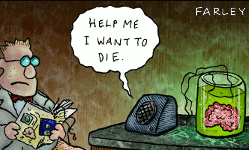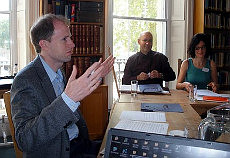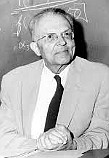What’s a logical paradox?
Preface
 This was written in 2009. (Revised 2022.) It explains the notion of a logical paradox in a way that comes naturally to me. The conclusion drawn at the end is probably the main thing for me (“We are blinder than we can imagine in matters of straightforward logical reasoning”) but it is not always emphasized by others!
This was written in 2009. (Revised 2022.) It explains the notion of a logical paradox in a way that comes naturally to me. The conclusion drawn at the end is probably the main thing for me (“We are blinder than we can imagine in matters of straightforward logical reasoning”) but it is not always emphasized by others!
 This was written in 2009. (Revised 2022.) It explains the notion of a logical paradox in a way that comes naturally to me. The conclusion drawn at the end is probably the main thing for me (“We are blinder than we can imagine in matters of straightforward logical reasoning”) but it is not always emphasized by others!
This was written in 2009. (Revised 2022.) It explains the notion of a logical paradox in a way that comes naturally to me. The conclusion drawn at the end is probably the main thing for me (“We are blinder than we can imagine in matters of straightforward logical reasoning”) but it is not always emphasized by others!
5. Descartes’s dream
 The 17th-century French philosopher René Descartes was in his study one day, working quietly at his desk, when he began to wonder if he was just dreaming of being in his study and working at his desk.
The 17th-century French philosopher René Descartes was in his study one day, working quietly at his desk, when he began to wonder if he was just dreaming of being in his study and working at his desk.
He was both startled and bemused to find that he had no way of ruling out that his current experience was just a dream!
He wasn’t the first person to be startled in this way, since this bewildering notion of not knowing whether you are awake or dreaming has been entertained throughout history and may be found in many cultures.
As far back as the 4th century B.C., the Chinese sage Zhuangzi is said to have dreamt that he was a butterfly and then to have wondered if he was actually a butterfly dreaming he was a man. Likewise, in Plato’s dialogue Theaetetus, we find Socrates wondering how one could tell whether one was awake or merely dreaming and Theaetetus confessing to having no answer:
These days, the difficulty is raised in terms of a mad scientist who has supposedly kidnapped you and is toying with your brain, while keeping it alive in a vat full of nutrients. A neurochemical genius, he cleverly stimulates the nerve endings in your brain, thereby feeding you the illusion of going about your business and living a normal life, while, in reality, you are just a brain in a vat in his laboratory on Mars.
 How do you know this is not your situation?
How do you know this is not your situation?
Amazingly, according to some, you don’t know! There is no way to tell! For all that you know, they say, you really might be a brain in a vat in a laboratory on Mars.
Needless to say, most people find this suggestion preposterous and refuse even to contemplate the possibility. The trouble, however, is that the reasoning which generates the possibility appears to be very compelling.
After all, if you were a brain in a vat, with your nerve endings rightly stimulated, your overall sensory experience would be indistinguishable from reality. You wouldn’t be able to tell the difference, so far as contemporary brain science tells us. The reasoning here is straightforward, being just a modern extension of the familiar illusion of dreaming, known in the same way to be engendered by local activity in the brain.
So, like it or not, we have a “compelling” piece of reasoning for an “unbelievable” conclusion, where the unbelievable conclusion—just to be clear—is that you don’t really know whether or not you are a brain in a vat in a laboratory on Mars. As we have seen, the rational mind will not suffer such unbearable tension, but how should we respond? Should we reject the reasoning or swallow the conclusion?
 Well, some people just swallow the conclusion, as mentioned. We really don’t know whether or not we are brains in vats, they unabashedly proclaim. The Oxford philosopher Nick Bostrom, for example, holds this view, and has even tried to take it a step further. Not knowing whether he is a brain in a vat, he has attempted to calculate the probability that he is a brain in a vat and has estimated this to be as high as one in three!
Well, some people just swallow the conclusion, as mentioned. We really don’t know whether or not we are brains in vats, they unabashedly proclaim. The Oxford philosopher Nick Bostrom, for example, holds this view, and has even tried to take it a step further. Not knowing whether he is a brain in a vat, he has attempted to calculate the probability that he is a brain in a vat and has estimated this to be as high as one in three!
Bostrom’s probability calculation is beyond our scope and we don’t really need to discuss it here. (See this engaging interview for more details.) The point is just that some people are genuinely prepared to swallow the “unbelievable” conclusion of the sensational piece of reasoning above and concede that they don’t know whether or not they are brains in vats.
 Another famous philosopher who swallows the conclusion is David Chalmers. Chalmers too professes to be uncertain whether or not he is a brain in a vat. “I can’t rule it out,” he says. He thinks, however, that this view can be made more digestible by holding that the virtual world of a brain in a vat is just as real as the world outside of the vat, but has merely “come into being” in a very different way. On Chalmers’s view then, a brain in a vat inhabits a real world, and not a fake one, and so it’s not that big of a deal if you don’t know whether or not you are a brain in a vat!
Another famous philosopher who swallows the conclusion is David Chalmers. Chalmers too professes to be uncertain whether or not he is a brain in a vat. “I can’t rule it out,” he says. He thinks, however, that this view can be made more digestible by holding that the virtual world of a brain in a vat is just as real as the world outside of the vat, but has merely “come into being” in a very different way. On Chalmers’s view then, a brain in a vat inhabits a real world, and not a fake one, and so it’s not that big of a deal if you don’t know whether or not you are a brain in a vat!
In contrast to Bostrom and Chalmers, others find this admission of ignorance, even in Chalmers’s digestible form, to be preposterous. Of course we know we’re not brains in vats, they exclaim, perhaps even rolling their eyes in scorn. The issue for them rather is to pin down where the “compelling” line of reasoning above goes wrong. (Rejecting the reasoning.) From their point of view, something must be wrong with the reasoning because its conclusion—that we don’t know whether or not we are brains in vats—is patently absurd.
As it happens, there is no shortage of suggestions as to where the reasoning goes wrong, although, as you may have guessed, none of them has been widely accepted. So the purported “flaw” in the reasoning cannot yet be said to have been pinned down! But let’s get a flavour anyway of some of these interesting suggestions. I’ll run through five of them, in increasing order of sophistication.
 An early suggestion was made by Descartes himself, who contended that God would never allow a mad scientist —or an “evil genius,” as Descartes put it—to manipulate us in such a dastardly way, and so we can be sure, if we believe in God, that we are not brains in vats! Being the great philosopher that he was, Descartes then offered a number of proofs of God’s existence!
An early suggestion was made by Descartes himself, who contended that God would never allow a mad scientist —or an “evil genius,” as Descartes put it—to manipulate us in such a dastardly way, and so we can be sure, if we believe in God, that we are not brains in vats! Being the great philosopher that he was, Descartes then offered a number of proofs of God’s existence!
 The appeal to God is not widely favoured, however, and, in our own time, the philosopher and cognitive scientist Daniel Dennett has argued, more simply, that no scientist could manipulate our brains in such a way as to feed us the experience of being in the real world because the task is so “computationally intractable” as to be “beyond human technology now and probably forever.” Unfortunately, despite Dennett’s advocacy, this view has not been widely endorsed either.
The appeal to God is not widely favoured, however, and, in our own time, the philosopher and cognitive scientist Daniel Dennett has argued, more simply, that no scientist could manipulate our brains in such a way as to feed us the experience of being in the real world because the task is so “computationally intractable” as to be “beyond human technology now and probably forever.” Unfortunately, despite Dennett’s advocacy, this view has not been widely endorsed either.
A more subtle attempt at rejecting the reasoning, inspired by the English philosopher G. E. Moore, is to observe that we are far more certain that we are not brains in vats than we could ever be about any “findings” of contemporary brain science—such as that realistic hallucinations may be generated by stimulating the brain. Such findings, after all, require years of observation and experiment before they can be accepted, whereas we have what can only be described as a bedrock conviction that we live in the real world, and are nothing even remotely like brains in vats. As such, we should naturally conclude, should these scientific findings raise the spectre of our being brains in vats, that something must be wrong with these “findings”!
This Moorean response, however, does not tell us what might be wrong with these findings, but only that they must somehow be wrong. This is not very satisfying though, because, remember, these scientific findings are backed by years of observation and experiment!
 A fourth, and somewhat radical try at rejecting the reasoning involves suggesting that the hypothesis that we are brains in vats is actually empty (unintelligible, meaningless) because nothing could possibly show, even in the least, whether the hypothesis was true or false! Being a brain in a vat is touted to be “completely indistinguishable” from being in the real world, but this apparent strength of the reasoning is actually a weakness because the very idea of being a brain in a vat is now in danger of being meaningless. It may be compared, philosophers have argued, to the equally “empty” hypothesis that the universe and all of its contents doubled in size last night while you were sleeping: how do you know this did not happen? One feels like protesting that this is just a nonsensical hypothesis with no actual meaning, since nothing could possibly show, even in the least, whether it was true or false! The brain in a vat hypothesis is held to be nonsensical in exactly the same way.
A fourth, and somewhat radical try at rejecting the reasoning involves suggesting that the hypothesis that we are brains in vats is actually empty (unintelligible, meaningless) because nothing could possibly show, even in the least, whether the hypothesis was true or false! Being a brain in a vat is touted to be “completely indistinguishable” from being in the real world, but this apparent strength of the reasoning is actually a weakness because the very idea of being a brain in a vat is now in danger of being meaningless. It may be compared, philosophers have argued, to the equally “empty” hypothesis that the universe and all of its contents doubled in size last night while you were sleeping: how do you know this did not happen? One feels like protesting that this is just a nonsensical hypothesis with no actual meaning, since nothing could possibly show, even in the least, whether it was true or false! The brain in a vat hypothesis is held to be nonsensical in exactly the same way.
This response has been attributed to the German-born philosopher Rudolf Carnap, pictured above, a prominent member of the early-twentieth-century school of logical positivism. The logical positivists championed a “verifiability criterion of meaning,” on which an empirical statement counts as being intelligible just in case there is some way of verifying (if only in principle) whether the statement is true or false. Since the brain in a vat hypothesis is supposed to be “unverifiable,” even in principle, it is literally unintelligible, by this criterion. Unfortunately, though, the verifiability criterion of meaning has not been widely accepted. Not many people think that the brain in a vat hypothesis is unintelligible, or otherwise nonsensical. The hypothesis seems, for most people, to have a perfectly clear meaning, despite our utter inability to verify whether it is true or false.
 Finally, let’s consider a sophisticated, late-twentieth-century attempt to resist the sceptical reasoning, pioneered by the American philosopher Hilary Putnam. Putnam claimed that a brain in a vat—particularly one that had been envatted all its life—would be unable to refer to ordinary physical objects like brains and vats, in virtue of being “causally isolated” from them. (This presupposes a “causal theory of reference,” which Putnam argued for as well.) For example, if a brain in a vat found itself using words like ‘brain’ and ‘vat,’ or looking at “pictures” of brains and vats, these words and pictures would not refer to actual brains and vats, but at best to “virtual” ones, which are the only ones the brain in a vat would have had causal interactions with.
Finally, let’s consider a sophisticated, late-twentieth-century attempt to resist the sceptical reasoning, pioneered by the American philosopher Hilary Putnam. Putnam claimed that a brain in a vat—particularly one that had been envatted all its life—would be unable to refer to ordinary physical objects like brains and vats, in virtue of being “causally isolated” from them. (This presupposes a “causal theory of reference,” which Putnam argued for as well.) For example, if a brain in a vat found itself using words like ‘brain’ and ‘vat,’ or looking at “pictures” of brains and vats, these words and pictures would not refer to actual brains and vats, but at best to “virtual” ones, which are the only ones the brain in a vat would have had causal interactions with.
It follows, Putnam observed, that, if we are brains in vats, then the sceptical reasoning above, as rehearsed by ourselves, will not be about actual brains and vats, whatever else it may be about, and will thus miss the mark. For the reasoning to be about actual brains and vats, it would have to be rehearsed by someone who was not a brain in a vat, but in that case, of course, the reasoning will also miss the mark! Putnam himself expressed the point more directly:
These are just some of the various striking suggestions that have been proposed for rejecting the troublesome reasoning above. You can find many more of these in the philosophical literature but we can’t really run through them here. (See Chapter 8 of this book for a quick historical overview. Or try this whole book for a study of some relatively recent suggestions.)
Suffice it to say that this embarrassment of riches has served only to emphasize that, even those who agree that the reasoning above is flawed, cannot quite agree on where it goes wrong. And so the matter remains unsettled.
 So this is another case where it is unclear if the compelling reasoning should be rejected, or if the unbelievable conclusion should be swallowed.
So this is another case where it is unclear if the compelling reasoning should be rejected, or if the unbelievable conclusion should be swallowed.
In other words, we have the makings of a genuine logical paradox—although this one is often called an epistemological difficulty, or a sceptical conundrum. The label doesn’t really matter. More important is the idea of a compelling piece of reasoning that culminates in an unbelievable conclusion, with no accepted way of defusing the tension, and we certainly have that here.
Those who take paradoxes seriously will go to great lengths to defuse such tension, since one can almost always learn something in the process. In the present case, the paradox suggests that we do not understand the relation between mind and world very well, and it is likely that only a proper understanding of these notions will put the paradox to rest.
For the moment, we can leave Descartes and the others in their meditations and take away a somewhat more general lesson from the examples that have been considered so far.

He was both startled and bemused to find that he had no way of ruling out that his current experience was just a dream!
He wasn’t the first person to be startled in this way, since this bewildering notion of not knowing whether you are awake or dreaming has been entertained throughout history and may be found in many cultures.
As far back as the 4th century B.C., the Chinese sage Zhuangzi is said to have dreamt that he was a butterfly and then to have wondered if he was actually a butterfly dreaming he was a man. Likewise, in Plato’s dialogue Theaetetus, we find Socrates wondering how one could tell whether one was awake or merely dreaming and Theaetetus confessing to having no answer:
SOCRATES. How can you tell whether at this moment we are sleeping and all our thoughts are a dream; or whether we are awake and talking to one another in the waking state?With the advent of modern science, such questions began to garner more attention and the issue is now acknowledged as a classic epistemological difficulty.
THEAETETUS. Indeed, Socrates, I do not know how to prove the one any more than the other for in both cases the facts precisely correspond. There is no difficulty in supposing that during all this discussion we have been talking to one another in a dream; the resemblance of the two states is quite astonishing.
These days, the difficulty is raised in terms of a mad scientist who has supposedly kidnapped you and is toying with your brain, while keeping it alive in a vat full of nutrients. A neurochemical genius, he cleverly stimulates the nerve endings in your brain, thereby feeding you the illusion of going about your business and living a normal life, while, in reality, you are just a brain in a vat in his laboratory on Mars.

Amazingly, according to some, you don’t know! There is no way to tell! For all that you know, they say, you really might be a brain in a vat in a laboratory on Mars.
Needless to say, most people find this suggestion preposterous and refuse even to contemplate the possibility. The trouble, however, is that the reasoning which generates the possibility appears to be very compelling.
After all, if you were a brain in a vat, with your nerve endings rightly stimulated, your overall sensory experience would be indistinguishable from reality. You wouldn’t be able to tell the difference, so far as contemporary brain science tells us. The reasoning here is straightforward, being just a modern extension of the familiar illusion of dreaming, known in the same way to be engendered by local activity in the brain.
So, like it or not, we have a “compelling” piece of reasoning for an “unbelievable” conclusion, where the unbelievable conclusion—just to be clear—is that you don’t really know whether or not you are a brain in a vat in a laboratory on Mars. As we have seen, the rational mind will not suffer such unbearable tension, but how should we respond? Should we reject the reasoning or swallow the conclusion?
⚹

Bostrom’s probability calculation is beyond our scope and we don’t really need to discuss it here. (See this engaging interview for more details.) The point is just that some people are genuinely prepared to swallow the “unbelievable” conclusion of the sensational piece of reasoning above and concede that they don’t know whether or not they are brains in vats.

In contrast to Bostrom and Chalmers, others find this admission of ignorance, even in Chalmers’s digestible form, to be preposterous. Of course we know we’re not brains in vats, they exclaim, perhaps even rolling their eyes in scorn. The issue for them rather is to pin down where the “compelling” line of reasoning above goes wrong. (Rejecting the reasoning.) From their point of view, something must be wrong with the reasoning because its conclusion—that we don’t know whether or not we are brains in vats—is patently absurd.
As it happens, there is no shortage of suggestions as to where the reasoning goes wrong, although, as you may have guessed, none of them has been widely accepted. So the purported “flaw” in the reasoning cannot yet be said to have been pinned down! But let’s get a flavour anyway of some of these interesting suggestions. I’ll run through five of them, in increasing order of sophistication.
⚹


A more subtle attempt at rejecting the reasoning, inspired by the English philosopher G. E. Moore, is to observe that we are far more certain that we are not brains in vats than we could ever be about any “findings” of contemporary brain science—such as that realistic hallucinations may be generated by stimulating the brain. Such findings, after all, require years of observation and experiment before they can be accepted, whereas we have what can only be described as a bedrock conviction that we live in the real world, and are nothing even remotely like brains in vats. As such, we should naturally conclude, should these scientific findings raise the spectre of our being brains in vats, that something must be wrong with these “findings”!
This Moorean response, however, does not tell us what might be wrong with these findings, but only that they must somehow be wrong. This is not very satisfying though, because, remember, these scientific findings are backed by years of observation and experiment!

This response has been attributed to the German-born philosopher Rudolf Carnap, pictured above, a prominent member of the early-twentieth-century school of logical positivism. The logical positivists championed a “verifiability criterion of meaning,” on which an empirical statement counts as being intelligible just in case there is some way of verifying (if only in principle) whether the statement is true or false. Since the brain in a vat hypothesis is supposed to be “unverifiable,” even in principle, it is literally unintelligible, by this criterion. Unfortunately, though, the verifiability criterion of meaning has not been widely accepted. Not many people think that the brain in a vat hypothesis is unintelligible, or otherwise nonsensical. The hypothesis seems, for most people, to have a perfectly clear meaning, despite our utter inability to verify whether it is true or false.

It follows, Putnam observed, that, if we are brains in vats, then the sceptical reasoning above, as rehearsed by ourselves, will not be about actual brains and vats, whatever else it may be about, and will thus miss the mark. For the reasoning to be about actual brains and vats, it would have to be rehearsed by someone who was not a brain in a vat, but in that case, of course, the reasoning will also miss the mark! Putnam himself expressed the point more directly:
If we are brains in vats, then the sentence ‘We are brains in vats’ says something false (if it says anything). In short, if we are brains in vats, then ‘We are brains in vats’ is false. So it is (necessarily) false.So we can be sure that we are not brains in vats by considerations drawn from the theory of reference! This provocative diagnosis has generated a large body of philosophical literature whose ramifications are still unfolding.
These are just some of the various striking suggestions that have been proposed for rejecting the troublesome reasoning above. You can find many more of these in the philosophical literature but we can’t really run through them here. (See Chapter 8 of this book for a quick historical overview. Or try this whole book for a study of some relatively recent suggestions.)
Suffice it to say that this embarrassment of riches has served only to emphasize that, even those who agree that the reasoning above is flawed, cannot quite agree on where it goes wrong. And so the matter remains unsettled.
⚹

In other words, we have the makings of a genuine logical paradox—although this one is often called an epistemological difficulty, or a sceptical conundrum. The label doesn’t really matter. More important is the idea of a compelling piece of reasoning that culminates in an unbelievable conclusion, with no accepted way of defusing the tension, and we certainly have that here.
Those who take paradoxes seriously will go to great lengths to defuse such tension, since one can almost always learn something in the process. In the present case, the paradox suggests that we do not understand the relation between mind and world very well, and it is likely that only a proper understanding of these notions will put the paradox to rest.
For the moment, we can leave Descartes and the others in their meditations and take away a somewhat more general lesson from the examples that have been considered so far.
Menu
 What’s a logical paradox?
What’s a logical paradox? Achilles & the tortoise
Achilles & the tortoise The surprise exam
The surprise exam Newcomb’s problem
Newcomb’s problem Newcomb’s problem (sassy version)
Newcomb’s problem (sassy version) Seeing and being
Seeing and being Logic test!
Logic test! Philosophers say the strangest things
Philosophers say the strangest things Favourite puzzles
Favourite puzzles Books on consciousness
Books on consciousness Philosophy videos
Philosophy videos Phinteresting
Phinteresting Philosopher biographies
Philosopher biographies Philosopher birthdays
Philosopher birthdays Draft
Draftbarang 2009-2024  wayback machine
wayback machine
 wayback machine
wayback machine

